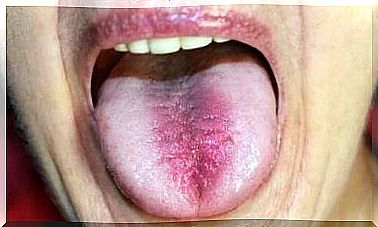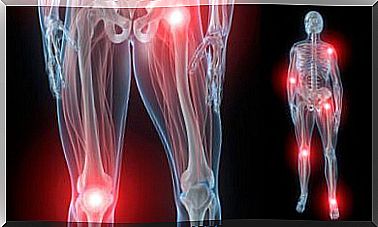Combating Psoriatic Arthritis Fatigue
Psoriatic arthritis patients tend to experience recurring episodes of fatigue. Adopting healthy habits in addition to treatment is crucial in coping with this symptom.

Did you know that there are some strategies you can take to help fight fatigue from psoriatic arthritis? This symptom is one of the consequences of this disease. Indeed, studies suggest that up to 50% of patients with skin conditions report moderate or severe fatigue.
Psoriatic arthritis is an inflammatory disease that compromises joint and skin health. Those who suffer from it experience pain and muscle stiffness, in addition to red, scaly patches that can extend to the scalp.
Although these conditions can be treated with oral and topical medications, other measures are also necessary. Particularly when the episodes of fatigue occur simultaneously. What to do in these cases? We tell you more in this article.
What is the link between fatigue and psoriatic arthritis?

The fatigue of psoriatic arthritis has received a lot of attention in recent years. Although she has always been experienced, studies about her have shed new light on her relationship to the disease.
Indeed, research has shown that about half of patients with psoriatic arthritis experience mild or moderate fatigue. In addition, nearly a quarter of those affected report episodes of intense fatigue.
There is no exact cause for the fatigue of psoriatic arthritis. However, some relevant factors that could provide an explanation have been found. The inflammation caused by arthritis releases a few proteins called cytokines, which could be responsible for fatigue.
In other cases, psoriatic arthritis occurs in conjunction with other medical problems that also lead to fatigue. For example :
- Anemia
- Overweight and obesity
- Diabetes mellitus
- Depression and anxiety
- Sleeping troubles
These and other medical conditions that coexist with psoriatic arthritis are diseases related to inflammation or dysfunction of the immune system. This can therefore worsen the feeling of fatigue.
Tips for treating fatigue from psoriatic arthritis
In most cases, the fatigue of psoriatic arthritis cannot be completely eliminated. However, maintaining a healthy lifestyle can make it easier to control it. So try to take into account the following recommendations.
1. Exercise regularly
Low-impact physical exercises are great for dealing with fatigue from psoriatic arthritis and other associated symptoms. This habit brings a boost of energy and helps reduce stiffness and joint pain. You can do activities such as:
- Swimming
- Gentle walks and jogging
- Lifting light weights
- Stretching and yoga
The ideal is to devote at least 30 minutes per day to obtain its benefits. Moreover, it is also advisable to practice with the supervision of a professional. Because poor execution can have undesirable effects.
2. Treating Psoriatic Arthritis Fatigue: Identifying Fatigue Triggers
Knowing the factors that trigger fatigue can sometimes be difficult. However, determining the causes can significantly help in the treatment. Therefore, it is recommended to keep a log of all daily activities and how they affect the energy level.
This includes :
- Food
- Stress levels
- Sleeping habits
- Exercise
- Medication consumption
- Environment
You should know that fatigue can also be a combination of all these factors. So, to find an adequate solution, it is better to have the advice of a doctor.
3. Eat a healthy diet for psoriatic arthritis

Diet plays a very important role in controlling fatigue from psoriatic arthritis. Although many people ignore it, the symptom can arise from a lack of nutrients or from anemia. A balanced and complete diet can therefore help reduce symptoms.
In this specific case, it is recommended to consume foods with anti-inflammatory properties, such as:
- Those that contain omega 3 fatty acids, such as oily fish, olive oil, dried fruits, and seeds
- Sources of antioxidants like fruits, vegetables, cocoa and tea
- Whole grains such as oats and brown rice
- Vitamin D supplements
4. Treat Psoriatic Arthritis Fatigue: Maintain a Relaxing Routine Before Sleeping
Patients with psoriatic arthritis tend to have trouble sleeping. This triggers, for obvious reasons, episodes of fatigue. Therefore, part of the plan to decrease symptoms is to maintain a relaxing ritual before going to bed. It is important to follow measures such as:
- Take a hot water bath or heat therapy before going to bed
- Maintain regular sleep schedules
- Avoid the consumption of alcohol, caffeine and nicotine
- Avoid distracting items in the bedroom, such as phones or computers
- Make a light dinner
5. Manage stress with psoriatic arthritis
Many complications of this condition are the result of poor stress management. Therefore, it is important to pay attention to this symptom to decrease the fatigue of psoriatic arthritis. In this regard, it makes sense to practice relaxation techniques. For example, meditation or yoga.
To conclude…
Remember to discuss the possible causes of fatigue with your doctor. There are several underlying conditions that could make the symptoms of psoriatic arthritis worse. Proper management can help maintain a good quality of life.









